- Home
- James S. A. Corey
Memory's Legion Page 5
Memory's Legion Read online
Page 5
“We didn’t kill the injured.”
“You killed one when he tried to bring his pistol up. The other one had a collapsed lung and choked on her own blood before your medics looked at her.”
“You want an apology?”
Dawes’s smile was cooler now.
“I want you to understand that I know every action that was taken on the station. Every order. Every shot fired, and from what gun. I know everything about that assault, and so does half the Belt. You’re famous out here.”
“You’re the one who asked what happened,” Fred said, shrugging as best he could with bound, numb arms.
“No, Colonel. I asked what happened to you.”
General Jasira’s private office was decorated like somebody’s idea of a British gentleman’s club. The furniture was all dark oak and darker leather. The heavy desk smelled like lemons and tung oil. The pen set and globe of Earth on top of it were both made of brass. The bookshelves were filled with real paper books and other souvenirs from a long lifetime of constant travel. There wasn’t an electronic device more complex than a lamp anywhere in sight. If it weren’t for the 0.17 lunar gravity, there would be no way to know it wasn’t an office in London in the early twentieth century.
The general was waiting for him to speak first, so Fred swirled the scotch in his glass instead, enjoying the sound the ice made and the harsh smell of the liquor. He drained it in one swallow, then set it back on the desktop in front of him, an invitation to be refilled.
As Jasira put another two fingers into it, he finally gave up on waiting. He said, “I imagine you’ve had some time to review the video the terrorists transmitted from Anderson.”
Fred nodded. He’d guessed this was the reason for the after-hours invitation. He tried another sip of scotch, but it had taken on a sour taste, and he put it back down.
“Yes, sir, I have. We were jamming radio all the way in, as per protocol, but we didn’t detect that little tightbeam relay they’d left—”
“Fred,” Jasira interjected with a laugh. “This isn’t an inquisition. You aren’t here to apologize. You did good, Colonel.”
Fred frowned, picked his glass up, then put it back down without taking a drink.
“Then to be frank, sir, I wonder what I am here for.”
Jasira leaned back in his chair.
“A couple of little things. I saw your request for an investigation into the negotiation team’s work. The declassification of the negotiation transcripts. That surprised me.”
As he spoke, Jasira rolled his shoulders, though in the moon’s fractional gravity they could hardly be tense. He must have spent a lot of time dirtside, and the habits died slow.
“Sir,” Fred said, speaking slowly and picking his words carefully, “because of the relay, the public has already seen the battle footage. We can’t put that genie back in the bottle. But no one seems to want to talk about the tightbeam they sent to us at the end there. We—”
“And how will this information change anything? You did your job, soldier. The negotiation team did theirs. End of story.”
“As it stands, sir, the people who took Anderson look like they’re insane, and we look like executioners,” Fred said, then stopped when he realized his voice was getting loud. Quieting down, he said, “There was some kind of mistake. That second message makes it clear that they thought they’d surrendered. A lot of people died over that miscommunication.”
Jasira smiled, but there was no humor in it.
“Don’t be so hard on yourself. You barely lost anybody,” the general said. “Anyway, the request’s denied. We have no reason to do any investigation on this matter. The battle footage is out, and as it stands that works in our favor. The simpler the message is, the more people will understand it: Take one of our stations, and we take it back. Hard. We can only confuse the issue by turning it political.”
“Sir,” Fred said, all warmth gone from his voice. “I killed 173 armed insurgents and over a thousand civilians in this action. You owe it to those people—you owe it to me—to show we did the right thing. What if we can avoid this happening next time?”
“There isn’t going to be a next time,” the general said. “You’re the one who saw to that.”
“Sir, you’re making it seem very much like this wasn’t a mistake at all. Who gave the order to ignore their surrender and send me in? Was it you?”
Jasira shrugged. “It doesn’t matter. You did what we needed you to do. We won’t forget that.”
Fred looked at his hands. He rose to his feet, a little too quickly, bouncing in the low g, and snapped a sharp salute. Jasira poured himself another glass of scotch and drank it off, leaving Fred standing as he did.
“Will there be anything else, sir?”
Jasira gave him a long, resigned look.
“They’re giving you the Medal of Freedom.”
Fred’s arm turned limp, and his salute collapsed under its own weight.
“What?” was all he could manage to say.
“I’m going back down the well. I’m too old to suck vacuum anymore. They’ll pin you with the UN Marines’ highest honor, then shortly thereafter give you your first star. You’ll have a seat here at OPCOM before the year is out. Try to look happy about it.”
The silence stretched. Fred focused hard on nothing about ten feet in front of him. Dawes watched him for almost a full minute, then gave up.
“All right. Why don’t I start, then?” Dawes said. “Here’s what happened. You were sleeping with one of the marines. Keeping it quiet because you were the commander, and that’s a no-no, right? So you’re very careful taking the station. You keep your casualties low, but you don’t get lucky and your lover dies.”
Fred kept his face stony and still. Dawes leaned back, resting on one long, thin arm like he was lounging under a tree in some sunlit park.
“You can’t get the usual psychological support,” Dawes went on, “because that would mean exposing the relationship, and you’re still ashamed of it. You have a little breakdown. You end up knocking around OPA bars hoping someone’ll kill you.”
Fred didn’t respond. His legs were past numb now and starting to hurt. Dawes grinned. He seemed to be enjoying this.
“No?” the OPA man said. “Don’t like that one? All right. How about this? Before you joined up with the Marines, you were a troubled kid. Did all kinds of bad things. Wild. Joining up is what straightened you out. Made you into the staunch, upright, legal, and appropriate guy you are today. But then the Anderson Station broadcast comes out. A bunch of people from your past see the feed and someone recognizes you. You come back a hero, but there’s a sting in it. You’re being blackmailed for… mmm. How about rape? Or, no. Drug trafficking. You used to cook tabs of grace in your dorm room, sell it at the clubs. Now it’s come back to haunt you, and you have a little breakdown. And you end up knocking around OPA bars hoping someone’ll kill you.”
Dawes waved a hand in front of Fred’s eyes.
“Still with me, Colonel? Don’t like that one either? All right. Maybe you’ve got a sister who came up the well, and you lost track of her—”
“Why don’t you save your fucking air,” Fred growled. “Whatever you’re here for, do it and be done.”
“Because why matters, Colonel. Why always matters. Whatever your story is, I know how it ends. It ends with you, here, talking to me. That’s the easy part, and I think you’re here looking for easy.”
“What the fuck is that supposed to mean?”
The woman with the rifle said something. Either her Belter patois was too accented and fast or it was some OPA verbal code because Fred couldn’t even cut the flow of syllables into individual words. Dawes nodded, took his hand terminal out of a pocket and keyed something in. Fred leaned forward, trying to get the blood flow back into his legs. Dawes put the hand terminal away.
“You changed, Colonel. The way you behave changed after Anderson Station. Before that, you were just another inner planets asshole who didn’t give a shit whether the Belt lived or died. You stuck to your bases and your stage-managed outreach programs and the station levels where the security gets paid by Earth taxes. And now, you’re not.
“I’ve lived in the Belt my whole life. I’ve known a lot of men who wanted to die. They act just like you. Women don’t. I haven’t figured that out yet, but the men? Even if they do take a walk outside or swallow a gun, there’s always this part before. Taking risks. Hoping the universe will do it for them. Make it easy. And the Belt’s an unforgiving environment. You want to die, getting sloppy’s usually enough.”
“I don’t give a shit what you think,” Fred said. “I don’t give a shit what you want, or who you know. And your popular psychology horseshit? Yeah, you can drink it with milk. I have nothing to justify to you. I did my job, and I’m not ashamed of any decision I made. With the same information, I’d do the same thing again.”
“With the same information,” Dawes said, latching on to the phrase hard. “You found something out, then?”
“Fuck off, Dawes.”
“What was it, Colonel? What kind of information turns the Butcher of Anderson Station into a suicide? What makes him into a coward?”
The hundred and seventy Belters occupying Anderson Station hadn’t taken offensive action yet. Fred watched the station in false-color IR.
“Priority flash traffic from OPCOM, sir, cross-checked and verified,” the intel officer on his monitor said. “Eyes only. Sending it to you now.”
There was only one line of text.
AUTHORIZATION TO RETAKE STATION GRANTED.
And that was that. Thirty-seven hours of negotiation was over. Outer Planets Command was tired of waiting, and they were unleashing the dogs.
Fred called up th
e company major and said, “Put them in their racks. We’re go for assault. Set the countdown timer to one hour.”
“Roger that, sir,” the major said with more glee than Fred was comfortable seeing.
One hour until they went into the station. Fred called up the negotiation team on the command ship.
“Psych Ops here,” said Captain Santiago, the team commander.
“Captain, this is Colonel Johnson. We’ve been given authorization to retake the station. My people go in in an hour. Do we have anything left to try? A Hail Mary pass? Have you warned them about the assault?”
There was no reason for secrecy. There would be no way to hide three Marine assault craft on breaching maneuvers.
The silence from the other end stretched out, and Fred was almost at the point of checking to see if the line was still open when the reply came.
“Colonel, are you double-checking my work here, sir?”
Fred counted to ten slowly.
“No, Captain. But I’m about to send six hundred marines into the station. In addition to the 170 hostiles, there are over ten thousand civilians. Many or all of them could die before the day’s out. I just want to make sure we’ve exhausted every other possibility before we commit to—”
“Sir, I’ve got my orders just like you do. We did what we could, but Psych Ops is standing down now. Your turn.”
“Am I the only one that sees that this doesn’t make any sense?” Fred said. “They claim they took the station because of a three percent cargo transfer fee? I mean, they already threw the administrator who implemented it out the damned airlock. There is literally nothing left for them to win by forcing a fight.”
The only answer was static.
“Let me talk to them,” Fred said. “Maybe if they hear it from a different voice, they’ll understand—”
“Sir,” Santiago cut in. “I am not authorized to do that. You want to argue about it? Call General Jasira back at OPCOM. Santiago out.”
Fred launched himself at Dawes, pushing out with numbed legs, and Dawes scuttled back. Fred landed on the deck hard. The world grayed out for a second, and he tasted blood. He struggled forward, trying to get at Dawes’s feet with his teeth if that was the best he could manage. He saw the Belter up to the knees, stepping back. Fred twisted. Something in his left shoulder made a sick crunching sound, and a sharp pain shot up his neck. Then the woman stepped forward.
He looked up into the triangular barrel of the fléchette rifle, and then past it to the woman’s eyes. They were the blue of oceans seen from orbit. There was no pity in them. Her thumb was on the safety. Her finger on the trigger. A little pressure, and the rifle would send a hundred spikes of steel thinner than needles through his brain. And she wanted to. It was in the set of her shoulders and the angles of her face how much she wanted to end him.
“The problem with you,” Dawes said, his voice calm and conversational as if they were sitting in a bar somewhere sharing a beer, “and I don’t mean this as a criticism of you in particular. It’s true of anybody who didn’t grow up in the Belt. The problem with you is that you are wasteful.”
“I’m not a fucking coward,” Fred said through his rapidly swelling lip.
“Of course you are. You’re smart, you’re healthy. Maybe a few hundred people out of forty billion have your combination of talent and training. And you’re trying to waste that very valuable resource. You’re like the guy who delays replacing his airlock seals when they start to leak. You think it’s just a little bit. It doesn’t matter. You’re one guy. You get killed, no big loss.”
He heard Dawes walking behind him, but his gaze was still on the rifle. Dawes grabbed Fred’s collar and hauled him back to kneeling.
“When I was growing up, my dad used to beat the crap out of me if I spat someplace other than the reclamation duct because we needed the water. We don’t waste things out here, Colonel. We can’t afford to. You understand that, though. Don’t you?”
Slowly, Fred nodded. Blood was seeping down his chin even though Dawes and the woman hadn’t laid an angry hand on him. He’d done this to himself.
“When I was about fifteen, I killed my sister,” Dawes said. “I didn’t mean to. We were on this rock about a week from Eros Station. We were going out of the ship to get some survey probes that got stuck in the slurry. I was supposed to check her suit seals, but I was in a mood. I was fifteen, you know? So I did a half-assed job of it. We went outside, and everything seemed fine until she twisted sideways to pull up a rock spur. I heard it on the comm link, and it just sounded like a pop. We had the old Ukrainian-style suits. Solid as stone unless something broke, and then it all failed at once.”
Dawes shrugged.
“You’re a fucking piece of shit, then, aren’t you?” Fred said, and Dawes grinned.
“Felt like that, yeah. Still do sometimes. I understand why someone could want to die after a thing like that.”
“So why not kill yourself?” Fred asked, then spat a dark red clot on the deck at his feet.
“I’ve got three more sisters,” Dawes said. “Someone’s got to check their seals.”
Fred shook his head. His shoulder vibrated with sudden pain.
“Why are you telling me this?”
“Builds rapport,” Dawes said. “How’s it working?”
Fred laughed before he knew he was going to. Dawes gestured, and the woman put up the rifle, walking back to her doorway.
“So. Colonel,” Dawes said. “What information did you get on Anderson Station that you ended up here talking to a sad sack of shit like me?”
Fred took a long breath.
“There was a message sent to us as we went in,” he said. “A message I didn’t see until it was too late.”
“Let me see it,” Fred said.
“There are a couple things here,” the lieutenant said. “Got a partial that was never sent. And one that looks like it’s being sent to the command ship on infinite repeat. Also, a running feed that looks like a straight dump of the security cameras.”
“Do the unsent partial first.”
The video started, and the man in the mining jumpsuit stared out of the screen. For Fred, there was a surreal quality to watching a man alive and speaking while his corpse lay cooling on the floor behind him.
I could have told him this would happen.
The dead man said, “Citizens of the solar system, my name is Marama Brown. I’m a freelance mining technician for Anderson-Hyosung Cooperative Industries Group. I, and some like-minded individuals, have taken control of the company resupply station.”
Fred hit pause and turned to his lieutenant. He had a sinking feeling in his gut. The dead man had expected this to get out. Even though he had to know they were jamming, he’d expected the message to be heard.
“Where was that security camera feed going?” Fred asked.
“I’ll check on that right now, sir,” the lieutenant replied, and called up the electronic warfare people back on the Dagmar. Fred tuned their conversation out, and hit play again.
“I believe—we all believe that this action is justified by what has been done here. A man named Gustav Marconi, the station administrator, recently implemented a three percent surcharge on supply transfers. I know that doesn’t sound like much to some of you, but most of us are living on the ragged edge out here. Prospectors, wildcat miners… you strike it rich or you starve. That’s the game. But now a bunch of us are going to have to buy three percent less supplies because it just got that much more expensive. You can eat a bit less food. You can drink a little less water. You can fly a little slower and stretch your fuel, maybe. You run life support at bare minimums. But—”
“Sir?” said the lieutenant, and Fred paused the playback. “Sir, the transmission, at least some of it, got out. They’d left a tightbeam receiver and broadcast transmitter anchored to a rock just outside our jamming range. We missed it. But the e-war geeks have triangulated its location and are sending a Phantom to frag it.”
Too late, Fred thought, and hit the play button again.
“—what if you’re already running at the bare minimum? How about every year, you just don’t breathe for three days? That would about cover it. Or you don’t drink any water for three days. Or you don’t eat for three days when you’re already on the brink of starvation. When there’s nothing left to cut back on, how do you make it up then?”

 Leviathan Wakes
Leviathan Wakes Gods of Risk
Gods of Risk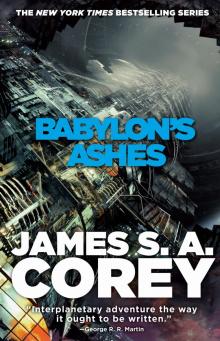 Babylon's Ashes
Babylon's Ashes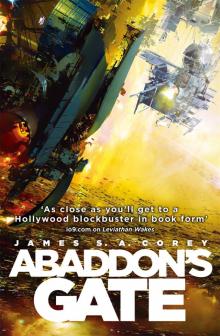 Expanse 03 - Abaddon’s Gate
Expanse 03 - Abaddon’s Gate Tiamat's Wrath
Tiamat's Wrath Persepolis Rising
Persepolis Rising The Butcher of Anderson Station
The Butcher of Anderson Station The Churn
The Churn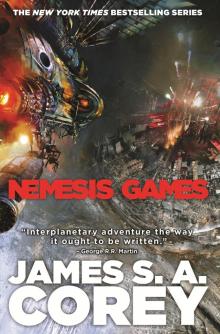 Expanse 05 - Nemesis Games
Expanse 05 - Nemesis Games Strange Dogs
Strange Dogs Honor Among Thieves: Star Wars
Honor Among Thieves: Star Wars Cibola Burn
Cibola Burn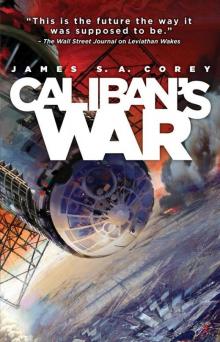 Caliban's War
Caliban's War The Vital Abyss
The Vital Abyss Auberon
Auberon Persepolis Rising (The Expanse)
Persepolis Rising (The Expanse)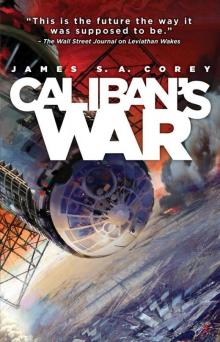 Caliban's War: Book Two of the Expanse series
Caliban's War: Book Two of the Expanse series Leviathan Wakes: Book One of The Expanse
Leviathan Wakes: Book One of The Expanse Cibola Burn (Expanse)
Cibola Burn (Expanse) Strange Dogs (Expanse)
Strange Dogs (Expanse) The Vital Abyss: An Expanse Novella (The Expanse)
The Vital Abyss: An Expanse Novella (The Expanse) Leviathan Wakes e-1
Leviathan Wakes e-1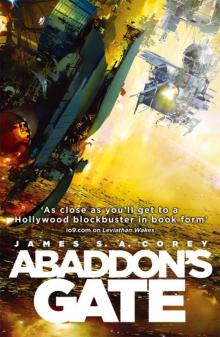 Abaddon's Gate e-3
Abaddon's Gate e-3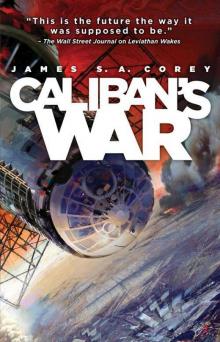 Caliban;s war e-2
Caliban;s war e-2 Gods of Risk: An Expanse Novella
Gods of Risk: An Expanse Novella Honor Among Thieves: Star Wars (Empire and Rebellion)
Honor Among Thieves: Star Wars (Empire and Rebellion)